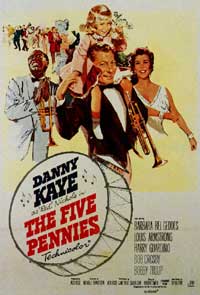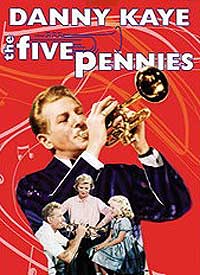 At his best Danny Kaye can be an awfully amusing song & dance man. So I've tried to figure out why I found him so cloying & annoying in The Five Pennies (1959). The film purports to be inspired by the life of Red Nichols, & Danny's character-name is Red Nichols, though any real resemblance to the cornet playing jazz man is lacking.
At his best Danny Kaye can be an awfully amusing song & dance man. So I've tried to figure out why I found him so cloying & annoying in The Five Pennies (1959). The film purports to be inspired by the life of Red Nichols, & Danny's character-name is Red Nichols, though any real resemblance to the cornet playing jazz man is lacking.
No one expects a Hollywood technicolor film to be biographically accurate but throughout this film Danny is clearly playing Danny Kaye, not Red Nichols, & might as well have called the character Twink Geekway.
The film doesn't even use Red's music. Although Red did play the cornet which Danny mimes, the songs written for the film, by Danny Kaye's wife Sylvia Fine, in no way capture any aspect or impression of the music of Red Nichols & His Five Pennies.
The film's attitude that Red with his cornet was the second greatest musician of the jazz age, after Louis Armstrong, & number one in his own mind, does not match reality in the slightest. The fact that Red's actual idol Bix Beiderbecke has no appearance in this biopic is alone enough to make it bewilderingly devoid of even the most important touchstones to Red's life, but this claim that there was only one good black jazzman in the world then there was white jazz that was the best, well, it's downright racist revisionism.
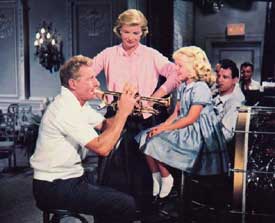 Danny is playing, for the first half of the film, a slapstick comedy figure, bumbling around the music industry in trashy novelty bands. Danny is playing, for the first half of the film, a slapstick comedy figure, bumbling around the music industry in trashy novelty bands.
He plays in a phony Cossack band, a phony Canadian mounties band, the phony Hawaiian band, & so on, music so bad we're supposed to find it funny & acceptable that he intentionally sabotages these poor acts, when in reality if the actual Red had made a habit of destroying novelty acts from within, he would've been one of the great villains of entertainment history.
The second half of the story, he plays an overacted whipped-dog sort of guy with phony seriousness. Twink Geekway temporarily gives up being a musician in order to focus his attention on his crippled daughter. The crippled daughter routines include even a moment when little Dorothy Nichols (Susan Gordon) has to crawl through the park on her belly dragging her poor pathetic legs in braces; as tearjerker moments go, it's an eye-roller instead.
On a comparative scale, the second half when Danny attempts to transform the slapstick story into something serious & brooding, he actually turns out to be better at the brooding than the comedy, though only because the comedy was so badly written & he couldn't save it.
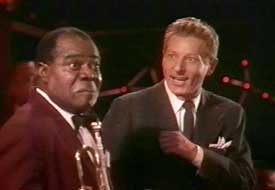 His interaction with the child actor who grows up to be Tuesday Weld, this is something he can sometimes do well even if the script is no help. Polio was an enormous public health threat when this film came out, & some real feeling manages to surface even from such a poor script. His interaction with the child actor who grows up to be Tuesday Weld, this is something he can sometimes do well even if the script is no help. Polio was an enormous public health threat when this film came out, & some real feeling manages to surface even from such a poor script.
A critical scene is when Twink throws his one-of-a-kind cornet into the sea, giving up jazz to care exclusively for his child. It's damned hoky; I half expected Clarence the Angel from It's a Wonderful Life to appear & show the horn what the future of music would be without jazz, & it would sound something like MTV today. Nevertheless, Twink's struggles to support his family without doing music are the toughest parts of the film.
I guess I wasn't surprised the comedy was so lame & the lame child so laughable, but what did surprise me was that the music was awful. Often in a musical there will be a story as crappy as this one, sure, but it will have staged musical numbers sprinkled throughout, & those can be enough to make an otherwise mediocre film seem excellent. And if they'd staged some Red Nichols style Dixieland, how could it go wrong?
Well, it sure went wrong. The new songs are swing pablum of the worst sort, & there's precious little quality in the abbreviated standards also included. It can be said that the music is better integrated to the script than usual for a musical, as Danny sings fragments of songs in context of the story rather than as separate stage events. But that just means there are few moments in the story when it stops being a bad story & becomes good for the music.
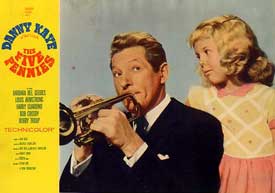 The exception, of course, is when Louis Armstrong makes his extended cameo appearances. His first appearance quite early in this overlong film is when Twinkus aka Red gets drunk for the first time in his life & wins the love of his Instant Wife (Barbara Bel Geddes). It is set in a very unconvincing Harlem speakeasy during Prohibition, where Louis headlines. The exception, of course, is when Louis Armstrong makes his extended cameo appearances. His first appearance quite early in this overlong film is when Twinkus aka Red gets drunk for the first time in his life & wins the love of his Instant Wife (Barbara Bel Geddes). It is set in a very unconvincing Harlem speakeasy during Prohibition, where Louis headlines.
Louis & his band do a fine set including a rendition of "One of These Days," & it even ends with a bit of Red Nichols horn (mimed by Danny) added, in an arrangement of "Glory Glory Hallelujah." Up to this point early in the film it looks like it's going to be pure corn but kind of fun. The corn is all we get from there on, however.
By the time Louis gets his second scene halfway through the terrible film, the director is forcing him to try to salvage one of the awful Sylvia Fine compositions instead of doing his own music. He sings Sylvia's "Good Night, Sleep Tight" to the the five year old girl, & he does almost save the song with his stylization. Then Armstrong's final duet with Twink, err, Red, when they do "The Saints Go Marching In," is the film's best musical moment, & it was almost worth sitting through this dog of a movie just for these few moments of Armstrong.
But as for any additional scene that might've seriously highlighted the actual music of Red Nichols, there just isn't one. Very occasionally Red's playing on the soundtrack is impressive, but it rarely lasts more than ten seconds at a stretch. Danny Kaye had used his weight, instead, to promote his wife's insipid musical compositions.
Danny always acted well with kids & some of the scenes with his character interacting with his daughter are good Danny Kaye moments, like when the five year old girl beats him at poker.
He sings the awful song "The Five Pennies" & other songs written by his real-life wife to his daughter. If you were never expecting good jazz & don't mind cutsie, these scenes can entertain. And inclusion of a tune not by his wife -- Twink also sings "The Music Goes Round & Round" to his five year old daughter -- is best of all among the muggin' with the kid scenes that are prelude to her contracting polio.
When this film came out, Red's own career had waned. Even the best big bands were vanishing one after another under the crushing blows of rock & roll, & Dixieland bands like Red's were even longer outmoded.
The Danny Kaye film gave a new boost to Red's career & he had an easier time getting gigs & a recording contract for a new final phase to his long career. So chances are Red wasn't complaining to be portrayed in the first half of the film as a clown whose antics destroyed other peoples' acts, & in the second half as mawkish hero from a Victorian stage melodrama.
If viewed as the imaginary biography of Twink Geekway, with nothing at all to do with Red Nichols, it comes off as a fair to good children's movie. The strong parts of the story are the interaction of Danny & the child actress, with that one extra special scene wherein the child star gets to be a sort of Little Eva to the sweetness of Louis Armstrong. Both Danny & Louis have powerful kid appeal & even kids who couldn't care less about jazz would surely enjoy these moments.
copyright © by Paghat the Ratgirl
|
